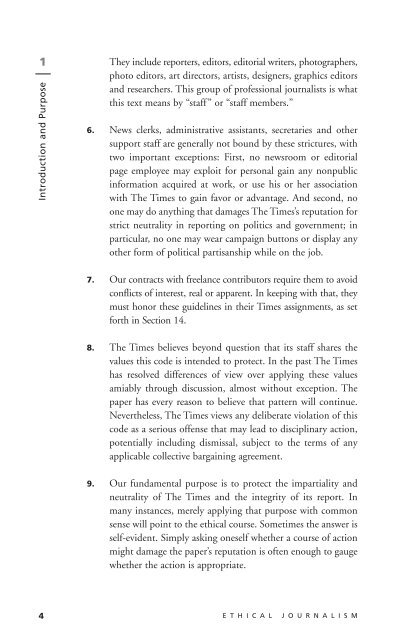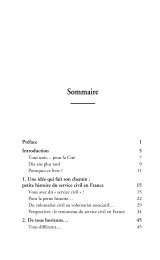Journalism Ethical - Graines de Changement
Journalism Ethical - Graines de Changement
Journalism Ethical - Graines de Changement
You also want an ePaper? Increase the reach of your titles
YUMPU automatically turns print PDFs into web optimized ePapers that Google loves.
1Introduction and PurposeThey inclu<strong>de</strong> reporters, editors, editorial writers, photographers,photo editors, art directors, artists, <strong>de</strong>signers, graphics editorsand researchers. This group of professional journalists is whatthis text means by “staff” or “staff members.”6. News clerks, administrative assistants, secretaries and othersupport staff are generally not bound by these strictures, withtwo important exceptions: First, no newsroom or editorialpage employee may exploit for personal gain any nonpublicinformation acquired at work, or use his or her associationwith The Times to gain favor or advantage. And second, noone may do anything that damages The Times’s reputation forstrict neutrality in reporting on politics and government; inparticular, no one may wear campaign buttons or display anyother form of political partisanship while on the job.7. Our contracts with freelance contributors require them to avoidconflicts of interest, real or apparent. In keeping with that, theymust honor these gui<strong>de</strong>lines in their Times assignments, as setforth in Section 14.8. The Times believes beyond question that its staff shares thevalues this co<strong>de</strong> is inten<strong>de</strong>d to protect. In the past The Timeshas resolved differences of view over applying these valuesamiably through discussion, almost without exception. Thepaper has every reason to believe that pattern will continue.Nevertheless, The Times views any <strong>de</strong>liberate violation of thisco<strong>de</strong> as a serious offense that may lead to disciplinary action,potentially including dismissal, subject to the terms of anyapplicable collective bargaining agreement.9. Our fundamental purpose is to protect the impartiality andneutrality of The Times and the integrity of its report. Inmany instances, merely applying that purpose with commonsense will point to the ethical course. Sometimes the answer isself-evi<strong>de</strong>nt. Simply asking oneself whether a course of actionmight damage the paper’s reputation is often enough to gaugewhether the action is appropriate.4E T H I C A L J O U R N A L I S M




